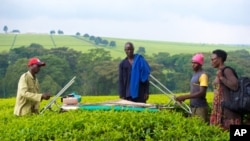The African continent is dotted with weather stations busy collecting data on rainfall, temperature wind conditions, and so forth. When this meteorological information is widely shared, it helps government policymakers and health professionals predict, prevent or mitigate weather-influenced diseases such as malaria, meningitis and plague.
The problem is, this critical data is not being widely shared in Africa, mainly because of the prohibitive costs of acquiring and sharing it. Now, scientists at Columbia University and elsewhere are hoping to change that at a global conference on climate and health to be held in Addis Ababa, Ethiopia, beginning April 4.
Across Africa, it’s easy to see the direct connection between climate conditions and disease. In humid parts of the continent more rainfall creates conditions where malarial mosquitoes can live longer and infect more people. In Africa’s semi-arid Sahel region, the hot dusty dry season makes people more susceptible to epidemic meningitis.
Finding ways to share information that connects climate and health data is one mission of Columbia University’s International Research Institute for Climate and Society, or IRI. It’s no easy task. IRI climatologist Bradfield Lyon explains that in Kenya, for example, where some 1,500 weather stations collect detailed data, fewer than 50 make their measurements publicly available. This forces scientists to rely on global satellite data, which produce less accurate models for local climates.
“There are different types of data sets we can view as climate scientists, like that which is remotely sensed from satellites," says Lyon. "There are certain data analyses that are put together that sort of interpolate between stations what is going on. But that’s not very useful information at a specific location.”
Indeed, while global or even continental climate data may be of interest in the abstract, people need to know about local climate trends. The best way to do that, says IRI epidemiologist Judy Omumbo, is to have daily records concerning rainfall, humidity, winds and other weather parameters over decades. Those measurements can then be correlated with local health records to detect overall trends.
“But because there are financial constraints, these often don’t get collected and put together into a central data base," says Omumbo. "Now with the passage of time there is very high likelihood that this information will get lost.”
Obtaining climate information can be very expensive in Africa because weather services often rely on the sale of data to generate revenues.
"So if you want to have the information, you’ve got to pay for it," says Omumbo. "And at the moment the going rate is something like $2 per parameter per day. So, if you are looking at picking up daily information or hourly information, it really adds up and becomes very expensive.”
Omumbo has had personal experience with these difficulties. For example, she and her colleagues at IRI learned that a tea plantation in the Kenyan highlands had been taking daily weather readings every day for over 50 years, but the plantation wanted to charge a high fee for releasing the data.
Then Omumbo learned that Kenya’s national weather service also had the data. Her team asked officials there to provide the data free of charge in the spirit of scientific collaboration for the common good. Eventually, they did, and Omumbo was able to use the data to confirm that temperatures in western Kenya have been rising.
“So a big part of our work is to build the awareness about the power of information and how by sharing information, you don’t actually lose," she says. "It is a gain, a benefit to society.”
At the conference on climate and health in Addis Ababa, Ethiopia, Omumbo is presenting policymakers with case studies and other empirical evidence that show how sharing climate data can help mitigate epidemics.
“And this is actually the real agenda that we are having in Addis. It’s to bring together policymakers in Africa and to look at the problems and the gaps, particularly about data information. We also have policy people in the health sector coming as well, representatives from the regional office of the WHO. We have representatives from the ministries of health at the highest level. If you do not address climate, then we cannot address the whole development issue as well. For me, development is empowering people to be able to do for themselves."




